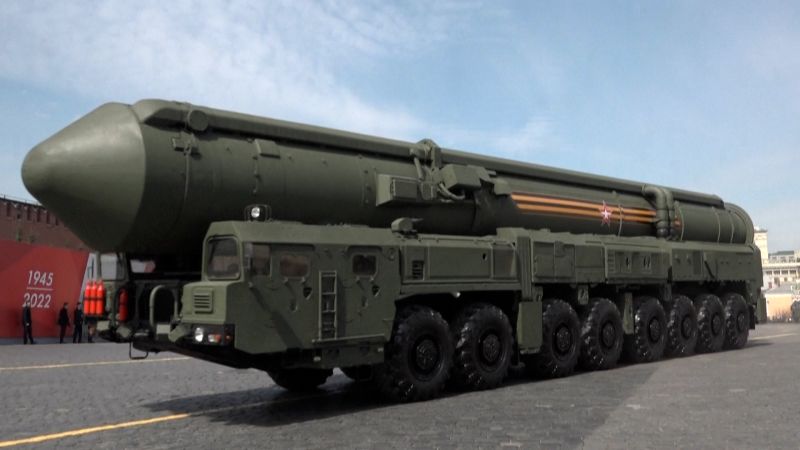President Vladimir Putin has ordered Russian forces to rehearse deploying tactical nuclear weapons, as part of military drills to respond to what he called “threats” by the West.
Since invading Ukraine in 2022, Putin has repeatedly made veiled threats to use tactical nuclear weapons against the West, but Monday marked the first time Russia has publicly announced drills.
“During the exercises, a set of measures will be carried out to practice the issues of preparation and use of non-strategic nuclear weapons,” Russia’s defense ministry said.
Non-strategic, or “tactical,” nuclear weapons can be used in battlefield situations, carrying less power than strategic nuclear weapons, which have the potential to level entire cities.
Russia’s defense ministry said the drills were ordered after “provocative statements and threats” by Western officials against Russia, which Kremlin spokesperson Dmitry Peskov said had reached “unprecedented levels.”
French President Emmanuel Macron last week reaffirmed that he would not rule out sending Western troops to Ukraine, as he warned of the risks Russia poses to European security and other countries near its borders.
“I’m not ruling anything out, because we are facing someone who is not ruling anything out,” Macron told The Economist magazine. “I have a clear strategic objective: Russia cannot win in Ukraine. If Russia wins in Ukraine, there will be no security in Europe. Who can pretend that Russia will stop there?”
And during a visit to Ukraine last week, British Foreign Secretary David Cameron said that Ukraine could use British-supplied weapons to strike targets inside Russia.
“In terms of what the Ukrainians do, in our view it is their decision about how to use these weapons. They are defending their country. They were illegally invaded by Putin and they must take those steps,” Cameron told reporters after the United Kingdom pledged continued financial and military support for Ukraine.
The drills announcement also comes shortly after the United States last month passed a long-delayed aid package for Kyiv, which will allow desperately needed military equipment and ammunition to flow to Ukraine as it tries to shore up its frontlines in the face of a renewed Russian onslaughts.
Russian forces last month made further gains in at least three locations along Ukraine’s eastern front, as Moscow tries to press home its manpower and ammunition advantage before the bulk of the US aid arrives in Ukraine.
Russia has tended to raise the nuclear specter when its invasion of Ukraine has hit obstacles or when other countries make new pledges of support for Ukraine. After Ukraine liberated large swathes of its territory in late 2022, Putin conceded that the war is “going to take a while” and warned of the “increasing” threat of nuclear war.
In February last year, Putin announced that Russia would suspend participation in the New START treaty, a key nuclear arms reduction agreement with the United States, the last remaining pact that regulates the world’s two largest nuclear arsenals. Putin said Russia would not be the first to test nuclear weapons, but would do so in the event of a US test.
After Macron said in February that sending Western troops to Ukraine could not be ruled out, Putin warned “this really threatens a conflict with the use of nuclear weapons, and therefore the destruction of civilization.”
US President Joe Biden and State Department officials have previously downplayed concerns that Putin could deploy a nuclear weapon, but continue to take the threats seriously.
In response to Russia’s latest announcement, the US said it had seen no change in Russia’s “strategic force posture” following Moscow’s announcement that it would begin tactical nuclear weapons drills, according to Pentagon spokesperson Maj. Gen. Patrick Ryder.
Ryder said Russia’s announcement is “completely inappropriate,” and “an example of the kind of irresponsible rhetoric that we’ve seen from Russia in the past.”
In Monday’s announcement, Russia’s defense ministry said the military’s General Staff had begun preparations for conducting “exercises in the near future with missile formations of the Southern Military District involving aviation as well as naval forces.”
On Tuesday, the Defense Ministry of Belarus said on Telegram it had held a “surprise inspection” of non-strategic nuclear arms carriers. President Alexander Lukashenko ordered the inspection to “test the entire range of activities from planning, preparation, and use of strikes with tactical nuclear weapons,” according to Belarusian Defense Minister Viktor Khrenin.
Khrenin also said that “a division of the Iskander operational-tactical complex and a squadron of Su-25 aircraft” have been transferred into positions for the drills.
Belarus does not possess its own nuclear weapons. Russia and Belarus signed an agreement to place Moscow’s non-strategic nuclear weapons in Belarus in May of 2023 and the transfer was completed by October of that year. Lukashenko has previously said that the nuclear weapons stationed in Belarus are for “defensive purposes” only and could be used to “respond to aggression.”
